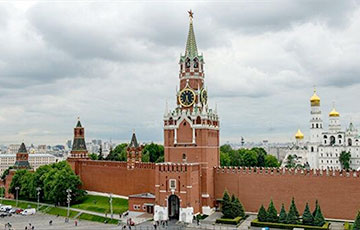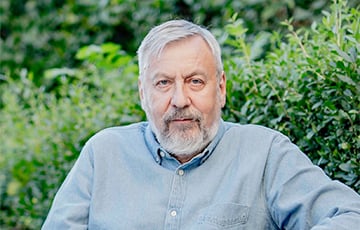The Doctrine Of Kremlin's Fear
7- Andriy Popov
- 30.09.2024, 10:44
- 23,420

Putin got frightened.
A criminal wanted internationally is in a panic. Because it is simply impossible to interpret the new “nuclear” doctrine of the Russian Federation, which was presented specifically for the Zelensky-Biden negotiations, in any other way.
The aggressor state, which is thirty (!) times larger than Ukraine, is once again grabbing the “nuclear club”. As it always does when the main local rat, hiding in a bunker, feels that its tail has been “set on fire” and something is really going on.
Against the backdrop of another shameful explosion of the “Sarmat” at the testing ground, these attempts by the Russians to scare us with nuclear weapons look ridiculous. However, the main target audience is not us at all, but the West. And everything is not so clear-cut there. Nevertheless, as an indicator, such a doctrine in itself is a sign of weakness.
Indeed, what is going on? Nothing secret — we are talking about the same strikes by Western “high-precision” on key objects in the Russian Federation. The West and Biden personally have been “giving birth” to this decision for many years in very severe agony. However, now talk about it has intensified.
And this is what is driving the Kremlin into a real panic. Because Ukrainian key objects (and these are defense plants, large warehouses and main logistics hubs) are inaccessible to the Russian Federation — after all, they are in the West. But Russian factories, airfields, strategic warehouses and other extremely valuable “goods” are becoming more accessible to Ukrainians.
What does it mean for the Russian Federation to lose most of the factories, warehouses and airfields in the European part of the sorry excuse of an empire? This is the end of the war. Because no Iranians, Chinese or “bad” Koreans will provide the volume of equipment, missiles and shells that the Russian Federation receives from its own production and storage bases.
And if we pull all this from, say, Siberia, we will get a “Russo-Japanese War 2.0”, which the then Tsar planned as a “small victorious war”, but lost, because, it turned out, pulling all the troops from Europe to the Pacific Ocean is time-consuming, expensive and simply pointless.
The second reason for the emergence of the new nuclear doctrine was the destroyed Russian Main Missile and Artillery Directorate warehouses — and the word “main” in the name is not for pathos, but literally indicates that these are the largest warehouses of missiles and shells. This was a “demo version” of systemic bombing of Russia in the event that we receive “thick” missiles.
This is “painful” for the Russian Federation. There are different estimates, but the losses at three warehouses are volumes close to the production of the entire Russian defense industry for a couple of months. It seems that the occupation units closest to these warehouses have already begun to experience a shortage, because in Vovchansk, Kharkiv region, the Ukrainians were able to launch a local counteroffensive and drive the occupiers out of the plant.
This does not mean that the Russians will run out of missiles and shells. But they will need to be delivered from the “backwoods” of who knows where — and this takes time and reduces volumes due to the limited capacity of the Russian logistics network.
Against this background, we should remember the “stub in the back” for Putin from the Saudis, who, according to the Financial Times, confirmed their intention to return to increasing oil production in December — from 9 to 11 million barrels per day, because their budget “is no longer able to handle” the large-scale infrastructure projects planned for the 2030 FIFA World Cup. And the Saudis are an indicator. If they increase production, then the entire OPEC+ does so too. They have long wanted to do this, because while they are reducing their production and sales, other countries, primarily the United States, are taking their niche.
And this will mean a drop in oil prices in the world. The intentions of the Saudis are not news (the news is that they confirmed these intentions against the backdrop of already falling prices), which is why the Kremlin has included in its own budget a decrease in oil and gas revenues in the coming years. However, at the same time, the Kremlin has included an increase in its military budget to 142 billion dollars, as Bloomberg reported.
How does one fit in with the other? It's simple — the Russian budget is calculated in rubles, not dollars. And the amount included in the increase in defense spending will mainly cover inflation and the devaluation of the ruble, and will not mean a radical increase in real spending. And this is exactly why the Kremlin needs to stop Ukraine at any cost in its ability to strike at Russian factories and airfields. Because they physically won't be able to pay even more for the war to build new factories and logistics, against the backdrop of falling oil and gas revenues.
If you can't radically increase your capabilities in conventional weapons, then the only way out for the Kremlin is to switch back to using “psychological” weapons. That's why Putin lost all sense of proportion in his doctrine.
A pretext for a nuclear response could be a drone launch, espionage from space, not to mention missile strikes, and a bunch of other pretexts. That is, anything could become such a pretext. Even threats to Belarus.
It should be added that in dictatorial regimes, all these doctrines are not worth even the paper they are printed on — as before, everything is decided exclusively by the word of the ruler and his perception of what will happen to him for it (good or bad — and if bad, then he does not make a decision). And a real nuclear conflict is already a completely different “weight category”, which Putin, most likely, will not dare to. Because here the “countdown” is turned on personally for the Russian tsar.
In addition, Ukraine is also not toothless — a significant part of Russian nuclear power plants are within reach of our weapons (even without Western missiles). In addition, a significant part of them, like the same Kursk NPP, have old reactors, similar to Chernobyl — that is, with minimal protection.
And if we take the worst apocalyptic forecast, where “the whole world turns to dust”, and then the plot of the Fallout game begins, then the Russian Federation will also receive its share of radioactive ash. We are unlikely to be happy about this, but that is the point — a real nuclear escalation always works in both directions. And this is without taking into account the American reservations about an “asymmetric conventional strike”. No one knows what they mean by this, but this is the “strategic uncertainty” — let the enemy think about the worst.
That is why Putin has not yet touched the “red button”, and will not touch it (if he wants to live). And he uses “nuclear weapons” exclusively as a “psychological weapon”. Because in this format it affects the weakest-willed representatives of the West, like Scholz or, unfortunately, Biden. The American president, if we are to believe the media, has once again postponed such an important decision for Ukraine and the Russian Federation about “high-precision” for later — this time they are calling a new meeting in the Ramstein format for October 12.
This is bad news for us, although the fact that the US is giving us a $7.9 billion aid package (5.8 billion from Pentagon warehouses, and another $2.1 billion in orders from manufacturers) is very good. Now the main question is what the content of these almost 8 “green yards” will be. Because now there is information only on guided bombs, but the US is not disclosing all the details (and rightly so — "”the fog of war”, “strategic uncertainty”, etc.)
What we end up with is a “stillborn” nuclear doctrine of the Russian Federation, which is an absolutely useless document precisely as a “doctrine” (when did Putin adhere to any doctrines?), but very useful to the Kremlin as a tool for influencing the Western audience in order to force Kyiv to capitulate — even before things go badly in the swamps.
Alas, the Western audience, accustomed to acting according to the rules, willingly becomes a “hostage” of those very rules: for them, a doctrine is an important document. And now they will spend some time analyzing where the Kremlin's new “red lines” are. Meanwhile, the Russians will advance in our East and South.
Andriy Popov, unian.net











